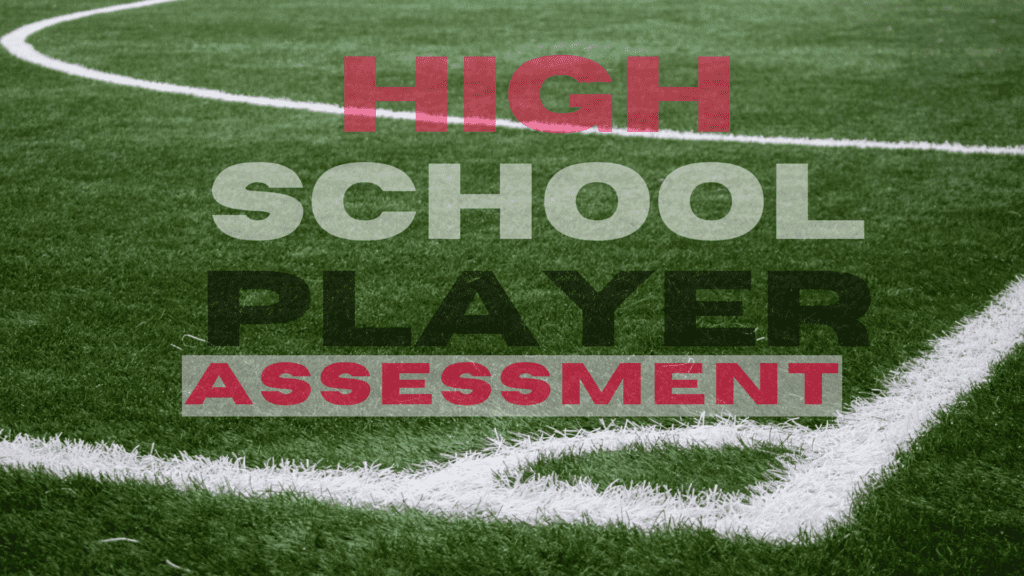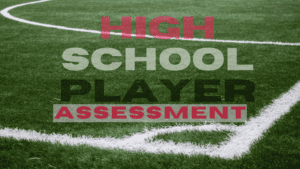Table of Contents
Toggle13 Reasons For A High School Recruiting Assessment
Unveiling Potential: The Importance of High School Recruiting Assessments.
In the dynamic world of collegiate sports, high school athletes aspire to take their game to the next level. As they eye the possibility of playing at the collegiate level, the journey begins with a crucial step: the high school recruiting assessment.
This comprehensive evaluation plays a pivotal role in determining whether athletes are not only ready, but also well-equipped to thrive in the competitive landscape of collegiate sports.
In this article, we’ll discuss the intricacies of high school recruiting assessments. Exploring how they uncover strengths and weaknesses, why they are essential, and the myriad of benefits they bring to high school athletes.
Understanding the High School Recruiting Assessment:
A high school recruiting assessment is more than just a series of tests; it’s a holistic approach to evaluating an athlete’s capabilities. Not only on the field, but off the field as well. This process involves a meticulous examination of an athlete’s physical attributes, skills, mental fortitude, and overall readiness for the challenges of collegiate-level play.
The ultimate goal is to provide college recruiters with a nuanced understanding of each athlete, enabling them to make well-informed decisions when extending scholarship offers.
Uncovering Strengths and Weaknesses:
The assessment process is designed to leave no stone unturned, revealing the unique qualities that make each athlete stand out, while identifying areas that may need improvement. Here’s a closer look at how these assessments shed light on an athlete’s strengths and weaknesses:
1. Physical Attributes:
- Assessments meticulously examine an athlete’s physical attributes, including height, weight, speed, and strength. These metrics provide valuable insights into the athlete’s potential contribution to specific positions and their ability to withstand the physical demands of collegiate competition.
2. Skills Evaluation:
- A detailed analysis of an athlete’s technical skills, tactical understanding, and adaptability to different game scenarios helps uncover strengths that can be leveraged at the next level. Simultaneously, it identifies areas for improvement, forming the basis for targeted training and development.
3. Mental Toughness:
- Beyond physical prowess, assessments gauge an athlete’s mental resilience, leadership qualities, and ability to handle pressure situations. These intangible attributes are crucial in the highly competitive and emotionally charged environment of collegiate sports.
4. Work Ethic and Commitment:
- Understanding an athlete’s off-season routine, involvement in club teams, and commitment to skill development provides valuable insights into their work ethic. This information helps recruiters gauge an athlete’s dedication to continuous improvement—a trait highly valued at the collegiate level.
The Necessity of High School Recruiting Assessments:
The question arises: why are these high school recruiting assessments necessary? The answer lies in the complex and demanding nature of collegiate sports. Here are several reasons why high school recruiting assessments are indispensable:
5. Informed Decision-Making:
- College recruiters face the challenge of identifying athletes who not only possess the requisite skills but also align with the values and culture of their programs. Athletic assessments equip recruiters with comprehensive data, enabling them to make informed decisions that go beyond statistics and accolades.
6. Tailored Development Plans:
- High school athletes are in a crucial phase of development. Assessments provide a roadmap for personalized training and development plans, addressing specific areas that can enhance an athlete’s performance and readiness for the collegiate stage.
7. Enhanced Collegiate Transition:
- Transitioning from high school to collegiate sports is a significant leap. Assessments help athletes understand the expectations, challenges, and level of competition they will encounter. This knowledge empowers them to make a smoother transition and hit the ground running.
8. Maximizing Collegiate Experience:
- For athletes, the collegiate experience extends beyond the playing field. Assessments consider an athlete’s character, sportsmanship, and ability to contribute positively to the team environment. This holistic approach ensures that athletes not only succeed athletically but also thrive in the academic and social aspects of collegiate life.
Benefits to High School Athletes:
Now, let’s explore the direct benefits that high school athletes stand to gain from undergoing a thorough recruiting assessment:
9. Individualized Feedback:
- Athletes receive detailed feedback on their performance, highlighting specific strengths and areas for improvement. This personalized insight serves as a roadmap for growth and development.
10. Targeted Skill Development:
- Armed with a clear understanding of their strengths and weaknesses, athletes can focus their efforts on targeted skill development. This strategic approach accelerates improvement and maximizes the impact of training sessions.
11. Increased Exposure and Opportunities:
- A positive assessment can significantly enhance an athlete’s visibility to college recruiters. By showcasing their capabilities and commitment to growth, athletes increase their chances of securing scholarship offers and opportunities to play at the collegiate level.
12. Preparation for the Next Level:
- The transition to collegiate sports can be daunting. A thorough assessment prepares athletes for the challenges ahead, mentally and physically. This preparation fosters resilience and adaptability, essential qualities for success at the collegiate level.
13. Comprehensive Self-Reflection:
- Athletes gain a deep understanding of themselves through the assessment process. This self-awareness extends beyond their athletic abilities, encompassing character, leadership, and work ethic. Such self-reflection is invaluable for personal growth both on and off the field.
In Conclusion:
In the realm of high school recruiting, assessments emerge as a cornerstone for aspiring athletes. They provide a multifaceted view of an athlete’s readiness for the collegiate stage, uncovering strengths, addressing weaknesses, and offering a pathway to growth. By embracing the insights gained through these assessments, high school athletes not only enhance their chances of playing at the collegiate level, but also embark on a journey of self-discovery and continual improvement. As the sporting world evolves, the high school recruiting assessment stands as a guiding light, propelling athletes toward their collegiate dreams.
If you would like to take the
High School Recruiting Assessment
click the image below!


